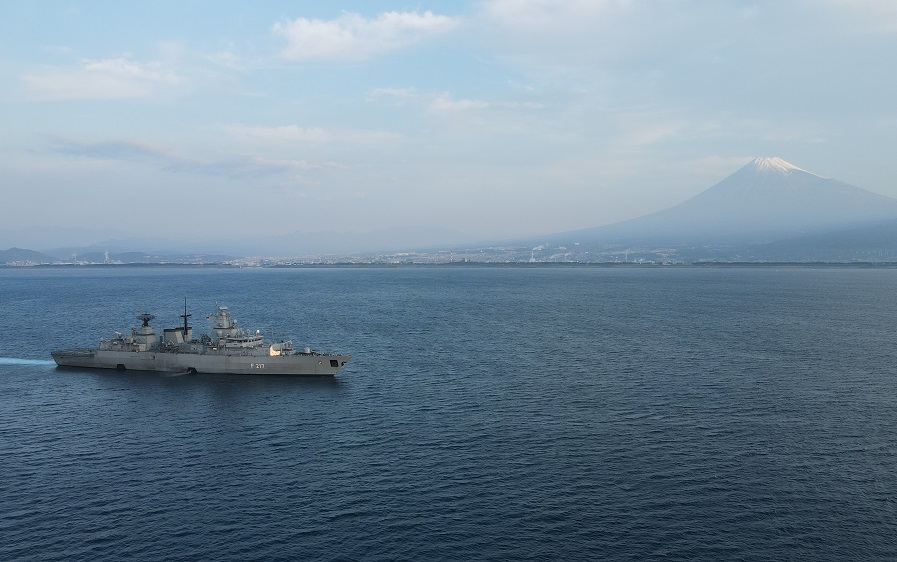Frigate deployment shows Germany’s intent in the Indo-Pacific
Posted By Bertil Wenger on February 17, 2022 @ 06:00

The German Navy frigate Bayern is making its way home after its six-month deployment to the Indo-Pacific. Earlier this week, the Brandenburg-class ship made its last refuelling stop [1] in Spain before heading to its home port in Wilhelmshaven.
The core of the ship’s mission was to ‘fly the flag’—to reannounce Germany’s ongoing commitment to the Indo-Pacific and the active role it intends to play geostrategically.
Formally billed as a training mission, the deployment also had both diplomatic and security-policy mandates. The Bayern and its crew engaged in training with German partners in the region, notably Australia, Singapore, Japan and the United States. But it was also about showcasing that Germany, in cooperation with its international partners, advocates and stands ready to defend the freedom of sea routes and compliance with international law in the region.
The deployment is a central component in the practical implementation of the German government’s Policy guidelines for the Indo-Pacific [2]. It is a formal contribution to maintaining a rules-based international order. In-depth cooperation with partners in the region is essential to achieve this goal. This includes joint exercises, but also participation in monitoring the UN sanctions against North Korea and, on the way there, supporting the NATO operation Sea Guardian and the EU’s Atalanta mission, visiting ports and crossing the South China Sea.
As Australian captain Gary Lawton stressed when the Bayern visited Perth, the Indo-Pacific region has become increasingly strategically important for both Germany and the European Union, and the visit was an opportunity to strengthen cooperation and understanding between the German and Australian navies.
The Bayern’s participation in monitoring UN sanctions against North Korea was aimed at applying pressure to Pyongyang to abandon its nuclear and missile programs. The UN Security Council tightened the sanctions further in 2017 and also sanctioned the delivery of oil and oil products. The purpose of such naval missions is to prevent these sanctions from being undermined by ships transferring their cargoes on the high seas.
Germany regularly emphasises the importance of the UN Convention on the Law of the Sea as a comprehensive and globally applicable legal framework, above all the freedom of navigation in international waters anchored in UNCLOS, but also the mandatory dispute settlement mechanisms regulated therein.
The arrival of the frigate in Australia was an especially important event in the two countries’ relations, given that the last time a German Navy ship visited Australia was in 1988. Back then, the German Navy’s sailing training ship Gorch Fock docked in Sydney.
In September 2020, the German government adopted the Indo-Pacific guidelines as a framework for strengthening its presence in the region, due to the decisive influence that events in the Indo-Pacific will have on shaping the international order in the coming years. The central pillars of this policy are diversifying Germany’s economic partnerships, promoting the rule of law, and strengthening multilateralism and security cooperation.
On 1 August, Germany joined ReCAAP, the Regional Cooperation Agreement on Combating Piracy and Armed Robbery against Ships in Asia. Security consultations were also held at ministerial level with key partners Japan and Australia. The strategic partnership with Australia was recently expanded into an ‘enhanced strategic partnership’. During the German presidency of the EU Council, the EU and ASEAN upgraded their relations to a strategic partnership in December 2020. Germany is also advocating the European Indo-Pacific strategy [3] that has been in effect since September 2021.
In terms of security policy, the German government referred to the increasingly expansionist behaviour of China in the Indo-Pacific region. While then foreign minister Heiko Maas and then defence minister Annegret Kramp-Karrenbauer avoided naming China explicitly in their statements flanking the Bayern’s departure in August 2021, it’s clear that the Bayern’s trip was intended to send a signal to the Chinese over their claims to power in the region.
Other countries like Japan and South Korea feel the threat of an ever more assertive China as well. And the US also expects more support from partners like Germany in Asia. China’s upgrading of its military over the past few years hasn’t gone unnoticed and developments are being closely monitored by Germany as a proponent of peace and stability in the region, but also as an exporting nation. A good 90% of global trade takes place by sea, mostly via the Indian and Pacific Oceans. The effects of an interruption in the supply chains to and from Europe became clear at the beginning of the Covid-19 pandemic.
The deployment of one ship may seem like a small act. But given the gruesome and complicated history of Germany in the 20th century and its consequent general reluctance to deploy forces internationally, it is a significant step.
This is the first unilateral military mission of the reunited Germany conducted outside the framework of an international peacekeeping mission. As such, it’s an important symbol of Germany’s readiness to fulfil its international duties and take up more responsibility in security and military affairs.
For Germany, the goal is to bring peace, stability and adherence to international law to the region, and do so in close cooperation with like-minded partners.
The new German government will have no choice but to follow this path and refrain from any form of fence-sitting when it comes to defending the core values and the way of life of Western, liberal and free societies in Europe and other regions of the world.
Article printed from The Strategist: https://www.aspistrategist.org.au
URL to article: https://www.aspistrategist.org.au/frigate-deployment-shows-germanys-intent-in-the-indo-pacific/
URLs in this post:
[1] made its last refuelling stop: https://twitter.com/FregatteBayern/status/1493142955477151749?cxt=HHwWisC9wezm2rgpAAAA
[2] Policy guidelines for the Indo-Pacific: https://www.auswaertiges-amt.de/blob/2380514/f9784f7e3b3fa1bd7c5446d274a4169e/200901-indo-pazifik-leitlinien--1--data.pdf
[3] European Indo-Pacific strategy: https://eeas.europa.eu/sites/default/files/jointcommunication_2021_24_1_en.pdf
Click here to print.